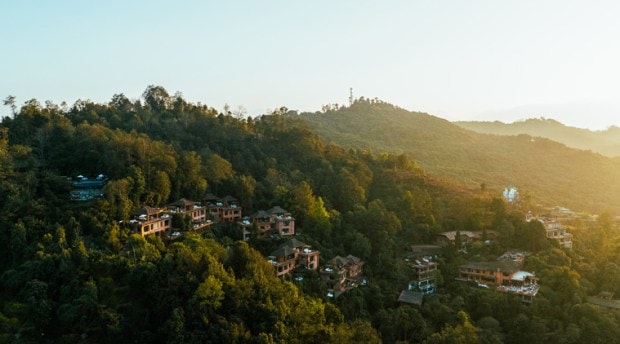What is the role of architecture in responsible tourism? How have you promoted sustainable tourism through a focus on traditional Nepali architecture in your properties?
Architecture is a powerful storyteller—it shapes the way travelers experience and connect with a place. At Dwarika’s, we believe that responsible tourism begins with honoring the soul of our heritage. Traditional Nepali architecture is not merely a design aesthetic for us; it is the essence of our identity and a living expression of our commitment to cultural preservation.
Through careful restoration, preservation, and revival, we have brought centuries-old wooden artifacts—some dating back to the 13th century—back into daily life. These exquisite pieces have been thoughtfully integrated into the fabric of our spaces, allowing them to live and breathe once more, not as static displays, but as meaningful elements of an immersive experience.
More than five decades ago, we established an in-house workshop dedicated to the traditional woodcraft of Nepal. This workshop remains active today, employing master artisans who carry forward these time-honored skills. Their work not only sustains a rare architectural tradition but also supports local craftsmanship and generational knowledge. By employing traditional building techniques and reclaimed materials, we have minimized environmental impact while creating a space that evokes the grandeur and spirit of 13th- and 14th-century Nepal. In doing so, Dwarika’s offers guests a rare opportunity—to not just witness history, but to live within it. Here, tourism becomes a force for conservation, cultural continuity, and sustainable livelihood.
What role can adventure tourism play in supporting rural communities economically? Have you seen this in practice at your property in Dhulikhel?
While our property in Dhulikhel is primarily centered around wellbeing—offering a serene space for rest, reflection, and rejuvenation—we also recognize the vital role that responsible tourism, including soft adventure, can play in uplifting rural communities. Beyond the rich array of wellbeing-focused activities within the property, we have thoughtfully curated experiences such as hiking and cycling that encourage guests to explore the surrounding landscapes and villages. These experiences are designed not only to connect visitors with the natural beauty and rhythm of rural life, but also to promote economic participation from nearby communities.
For instance, our cycling experiences are organized in collaboration with a local organization, ensuring that the benefits of tourism flow directly to those living and working in the area. Additionally, our organic farms in Dhulikhel serve as both a source of nourishment for our guests and a means of livelihood for the local community. By nurturing traditional organic farming practices, we aim to preserve sustainable methods of cultivation while supporting local economic development. In this way, adventure tourism—when integrated thoughtfully—can become a powerful bridge between wellbeing, cultural preservation, and rural empowerment.
What are some other outdoor activities you offer at Dhulikhel?
At our Dhulikhel property, we curate experiences that foster a deep connection between guests, the land, and the local community. One of our most enriching offerings is the spiritual hike—an introspective journey along ancient forest trails leading to sacred sites nestled in the hills. Along the way, guests are invited to engage in quiet reflection, immersed in the natural serenity of the surroundings. The experience culminates in a meaningful interaction with resident monks, offering insight into their way of life and spiritual practices, followed by a simple, wholesome lunch shared in their monastery.
We also offer guided cycling adventures to nearby heritage towns such as Panauti, where guests can witness rural life up close and explore the rich cultural tapestry of the region. Our farm visits provide another layer of connection, allowing travelers to engage with the rhythms of traditional agriculture—participating in seasonal activities and learning about organic farming practices that have sustained local communities for generations. Guests are welcomed with a simple, lovingly prepared meal by our farmers, featuring ingredients harvested fresh from the fields. The journey to the farm can be tailored to individual preferences: guests may choose to hike both ways for a deeper immersion, or enjoy a scenic one-way drive paired with a leisurely countryside walk. Each experience is thoughtfully designed to be immersive, mindful, and deeply rooted in the spirit of place—inviting guests not only to explore, but to truly belong.

What would you say are the biggest challenges facing adventure tourism in Nepal?
One of the biggest challenges is maintaining a balance between growth and sustainability. As adventure tourism continues to expand, there is a pressing need for better infrastructure, especially in more remote regions, to ensure accessibility. However, overdevelopment or unregulated growth can harm the very landscapes and cultural heritage that make Nepal so attractive to travelers. Another issue is of environmental impact. Adventure tourism can put pressure on fragile ecosystems, and it’s important that we actively work towards minimizing that impact through responsible practices and promoting eco-friendly alternatives. The future of adventure tourism in Nepal will depend on how well we can address these challenges while fostering a more sustainable and community-driven approach.
Tell us a bit about how you’ve managed to combine an activity like trekking with a visit to an organic farm where guests can learn more about sustainable farming practices? Is this the future of adventure tourism?
At Dhulikhel, we’ve reimagined adventure by blending it with mindfulness and sustainability. One of our most grounding experiences combines a three-hour forest walk with a visit to one of our organic farms, Darimbot, offering guests a slower, more intentional way to engage with nature and community. The journey unfolds along serene trails, guiding guests through wooded hills to reach Darimbot—a farm where traditional organic practices are thoughtfully preserved. Here, visitors are invited to take part in seasonal activities such as seed planting, composting, and organic harvesting. It’s a hands-on opportunity to connect with the land in its most authentic and unfiltered form.
Following the experience, guests are welcomed with a simple, nourishing meal lovingly prepared by our farmers, using ingredients freshly harvested from the very soil they’ve walked upon. It’s a moment to pause, to share, and to reconnect with the quiet beauty of rural life. This blend of movement, learning, and humble nourishment reflects the evolving spirit of adventure tourism: slower, more mindful, and deeply rooted in place and purpose.
Disclaimer
This article contains sponsored content that may not reflect the independent opinion or views of FinancialExpress.com. Further, FinancialExpress.com cannot be held responsible for the accuracy of any information presented here. Please consult a certified financial advisor before making any decisions based on this article.
